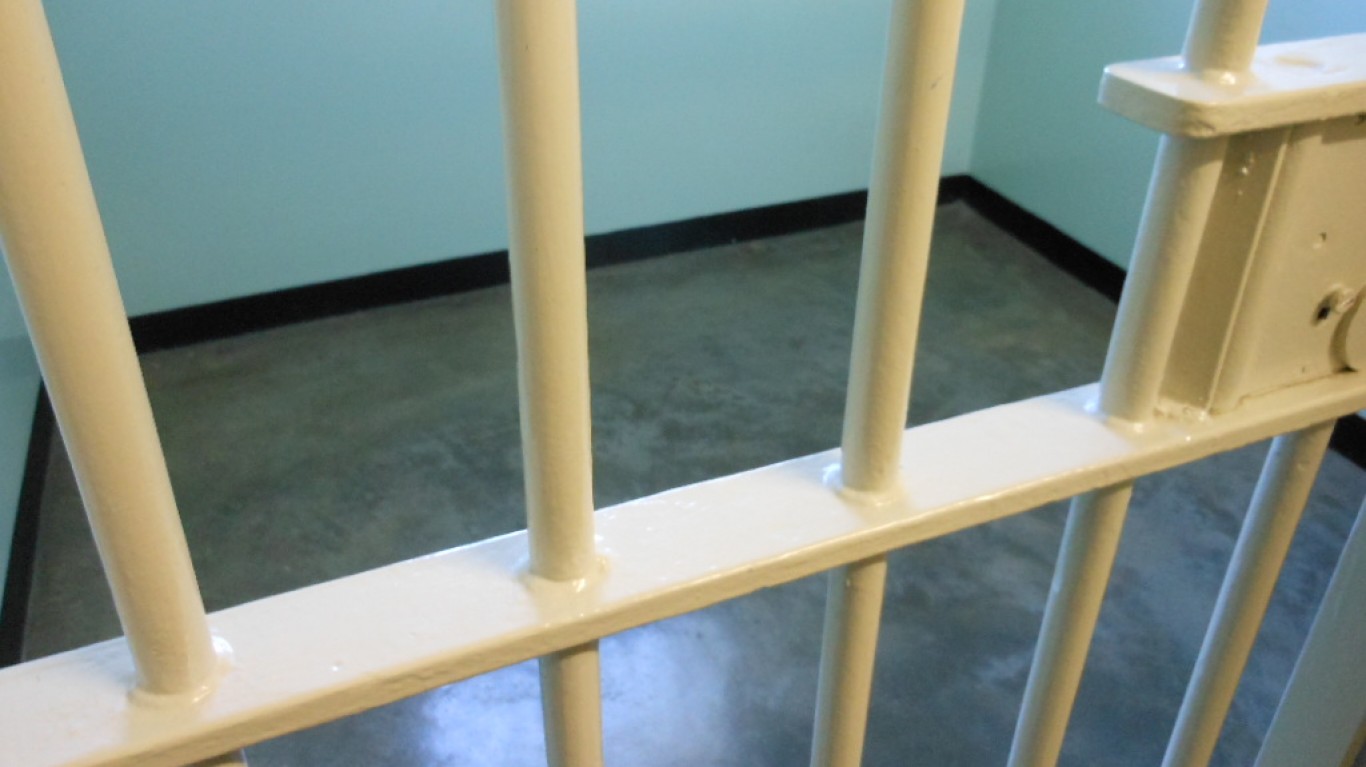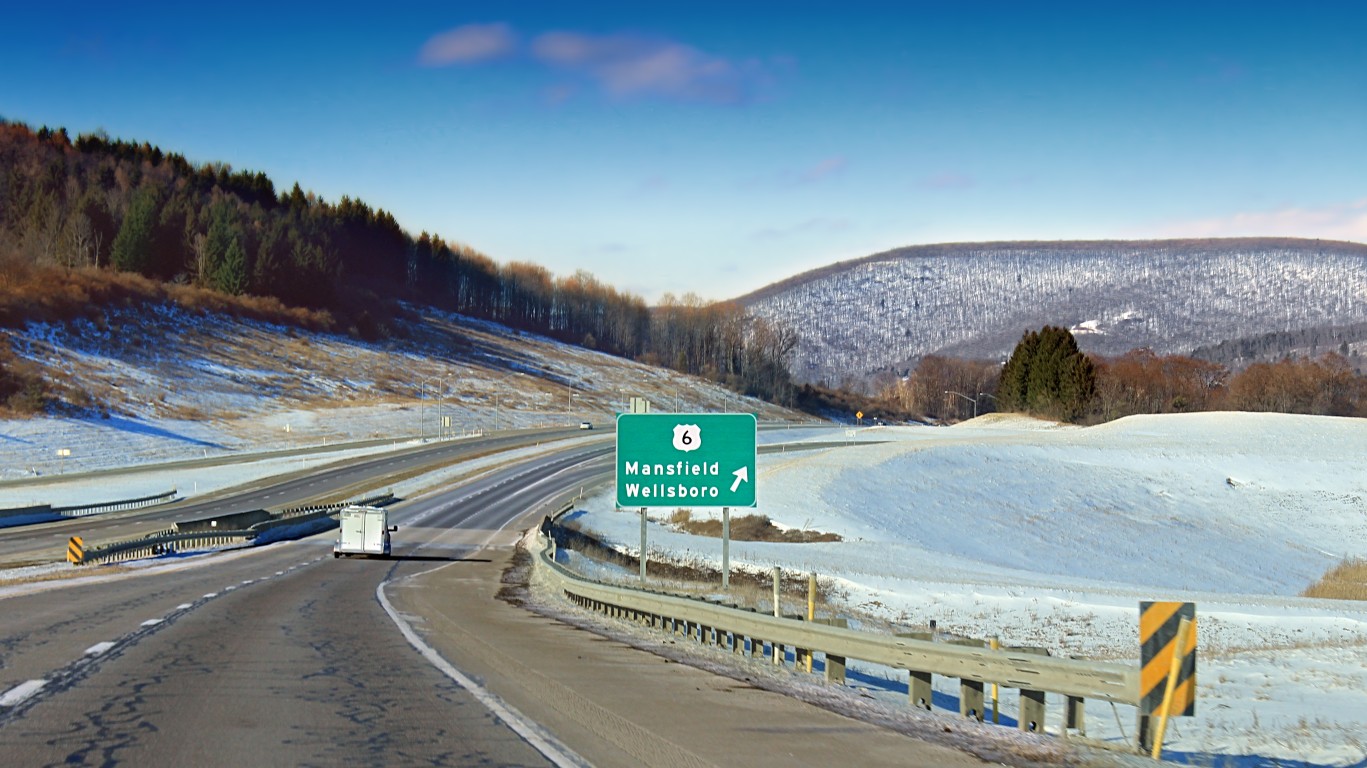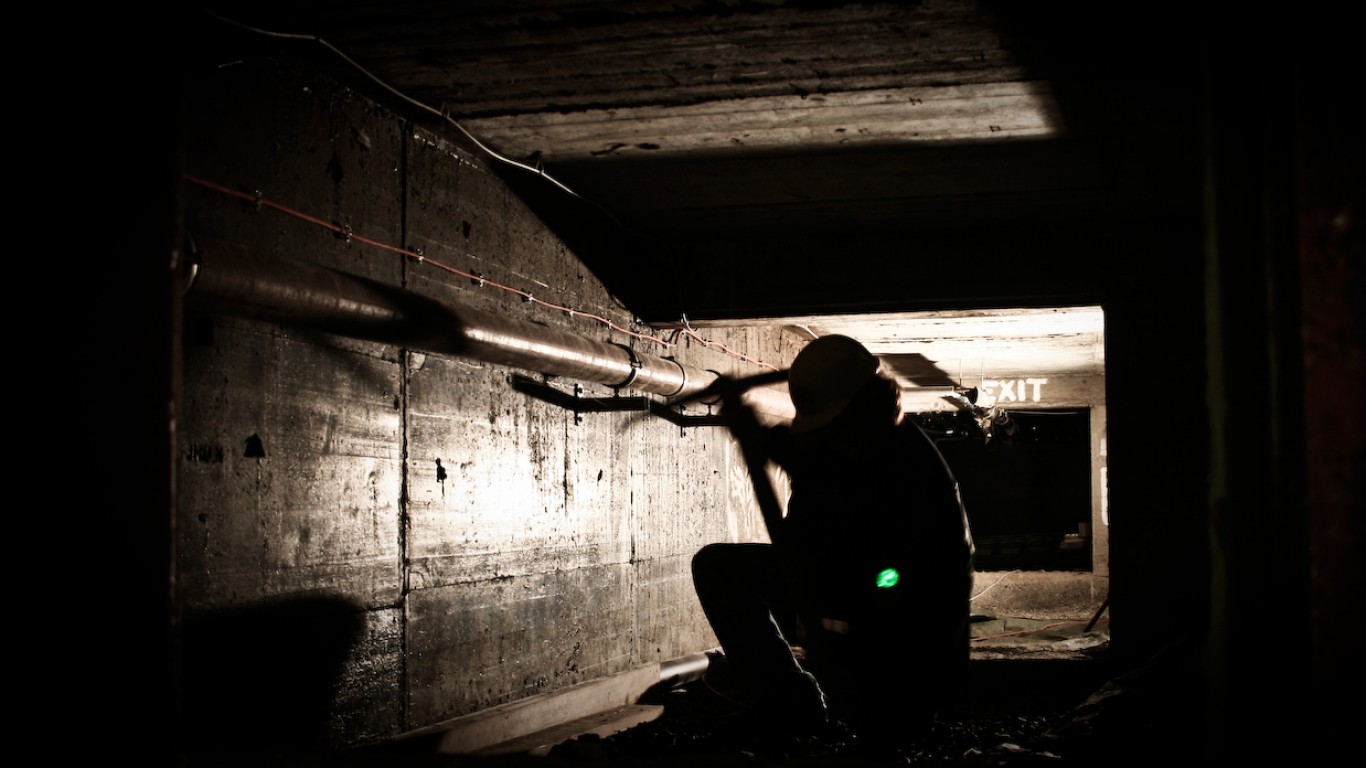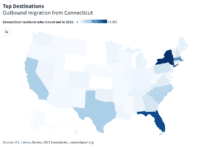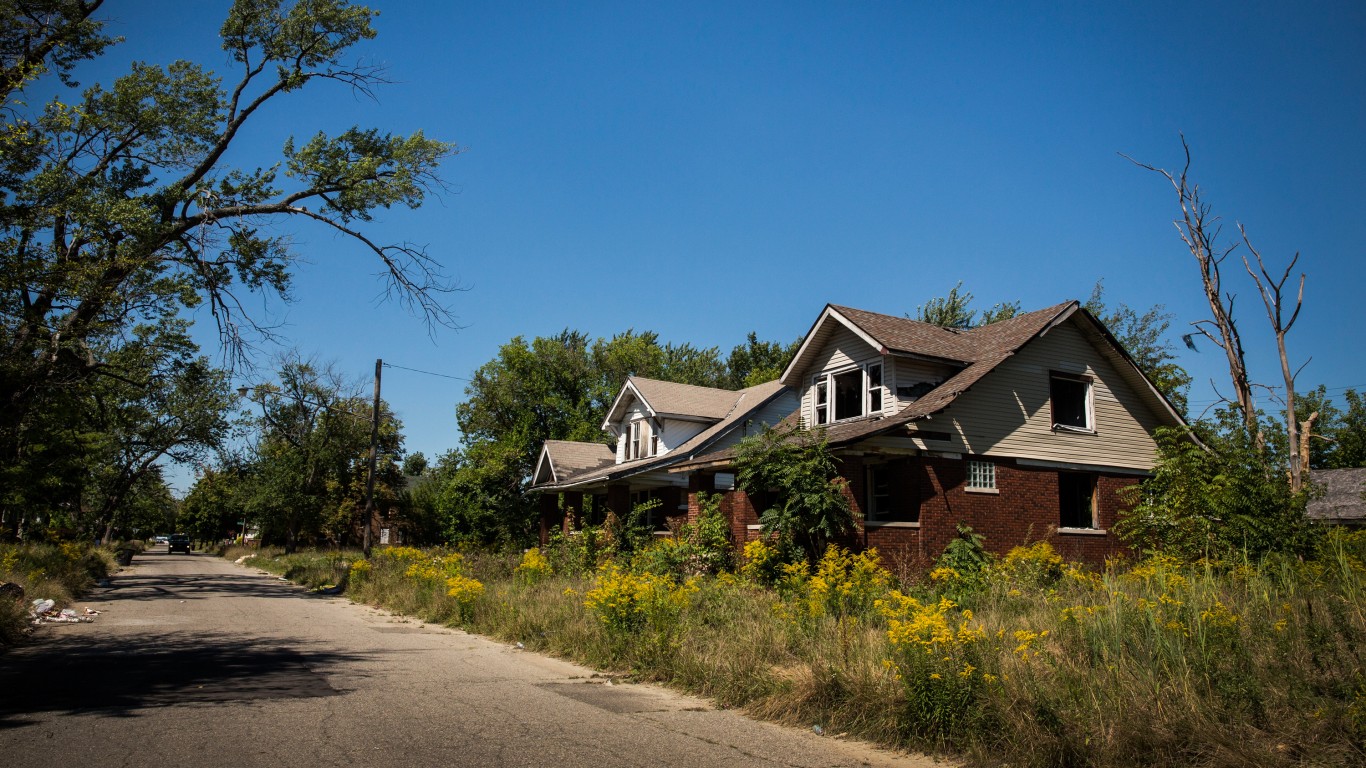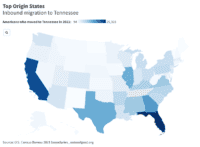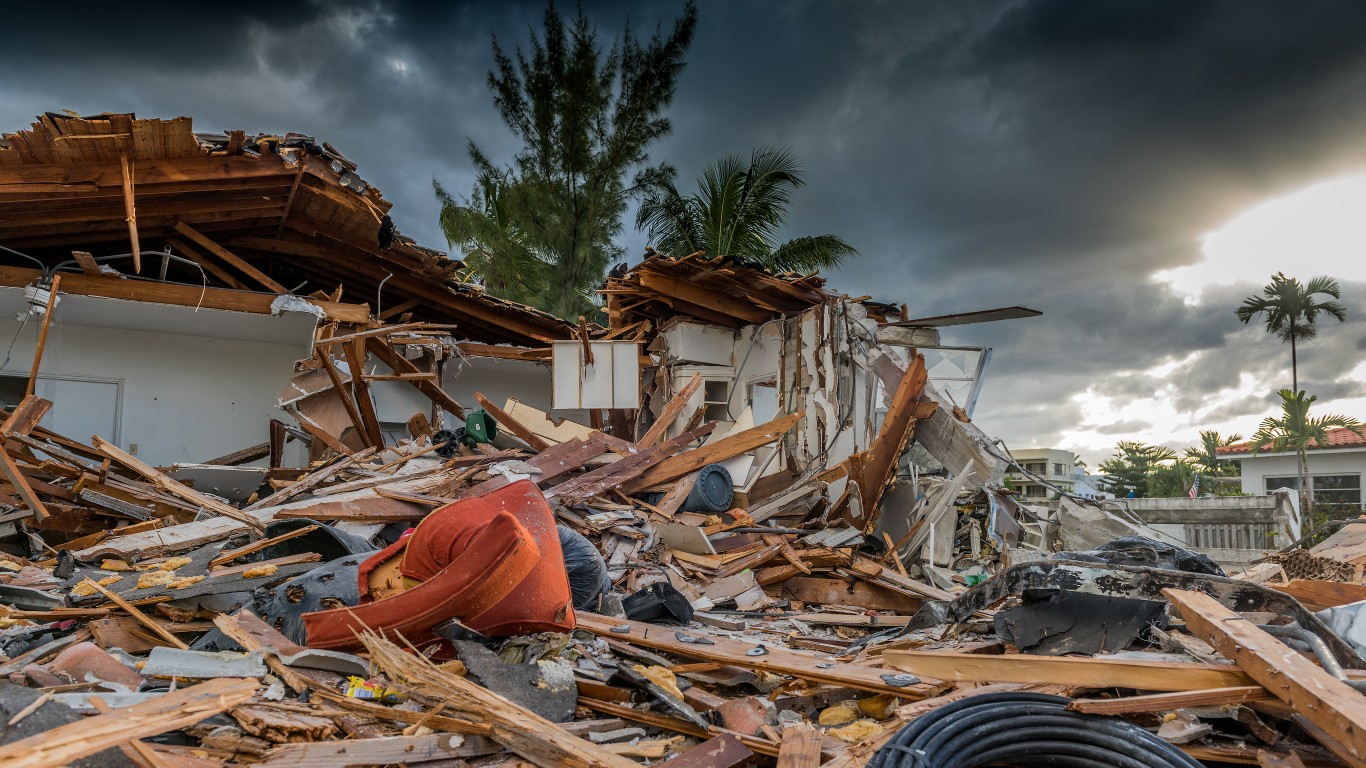
Each of the 50 states is a product of its own unique history, laws, culture, and geography. Indeed, no two states are exactly alike, and many of the attributes that make each state unique are a point of pride. Other unique characteristics, however, are not.
Across hundreds of measures related to governance, safety, personal finance, state finance, industrial output, environmental sustainability, climate, and more — every state has at least one area in which it excels, performing better than any other state. Conversely, every state also has at least one area in which it performs worse than most states.
24/7 Wall St. reviewed a range of data sets and state facts to identify the worst statistics about every state. In compiling this list, we prioritized a diversity of measures. Data came from sources including the U.S. Census Bureau, the Centers for Disease Control and Prevention, and the FBI.
In many cases, a state’s worst statistics is largely a product of governmental priorities. These statistics include measures like a poorly funded public pension system, low investment in education, and a near-junk credit rating status. While not necessarily an indictment of current state government leadership, measures such as these can be indicative of poor management — past or present. Here is a look at the best- and worst-run states.
In many other cases, the worst statistic is largely out of the control of any state government or population. These statistics include measures related to extreme temperatures and the likelihood of destructive storms. Here is a look at every major U.S. city’s worst weather event.
Click here to see the worst statistics about your state
Click here to see the best statistic about your state
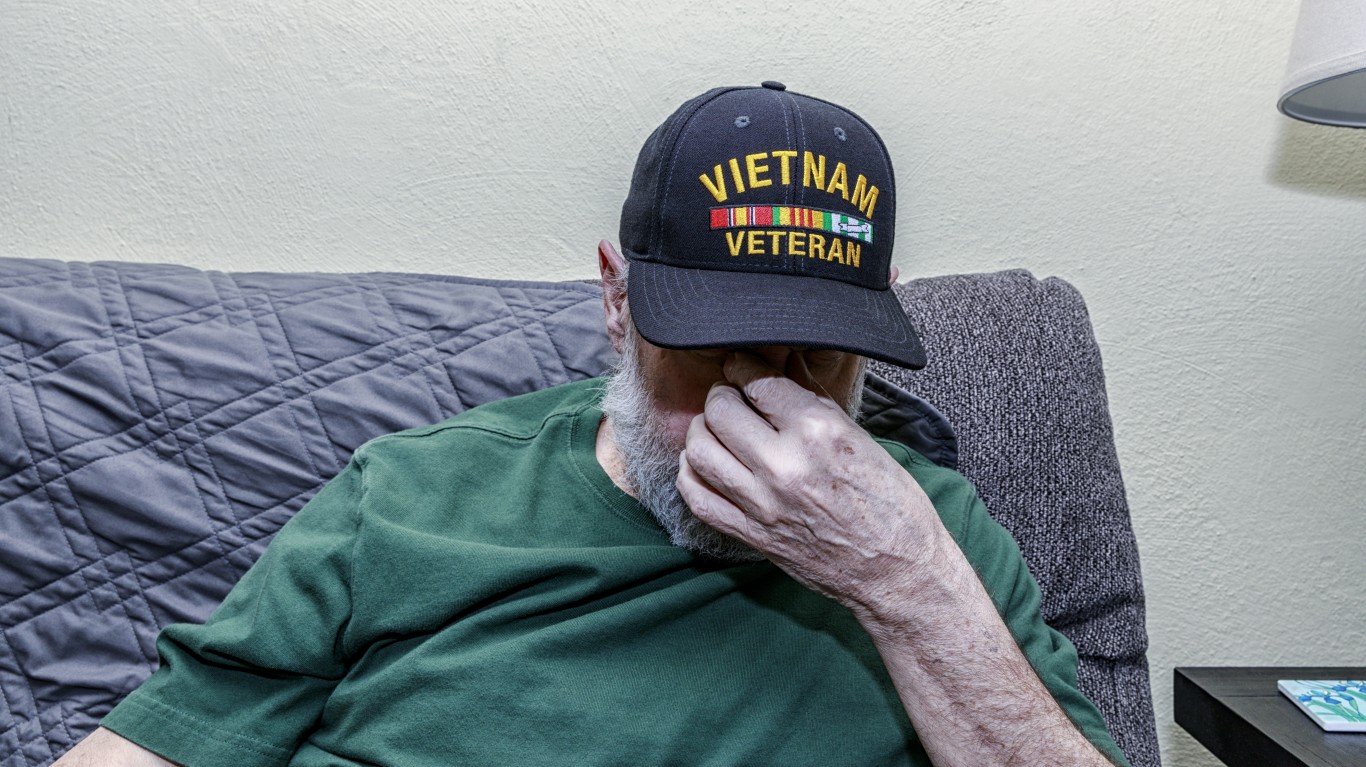
Alabama
Statistic: 91 mental health professionals for every 100,000 people
Alabama has the lowest concentration of mental health professionals of any state. Massachusetts, the state with the greatest concentration, has over six times as many mental health care providers per 100,000 people, according to County Health Rankings & Roadmaps, a Robert Wood Johnson Foundation and University of Wisconsin Population Health Institute joint program.
[in-text-ad]
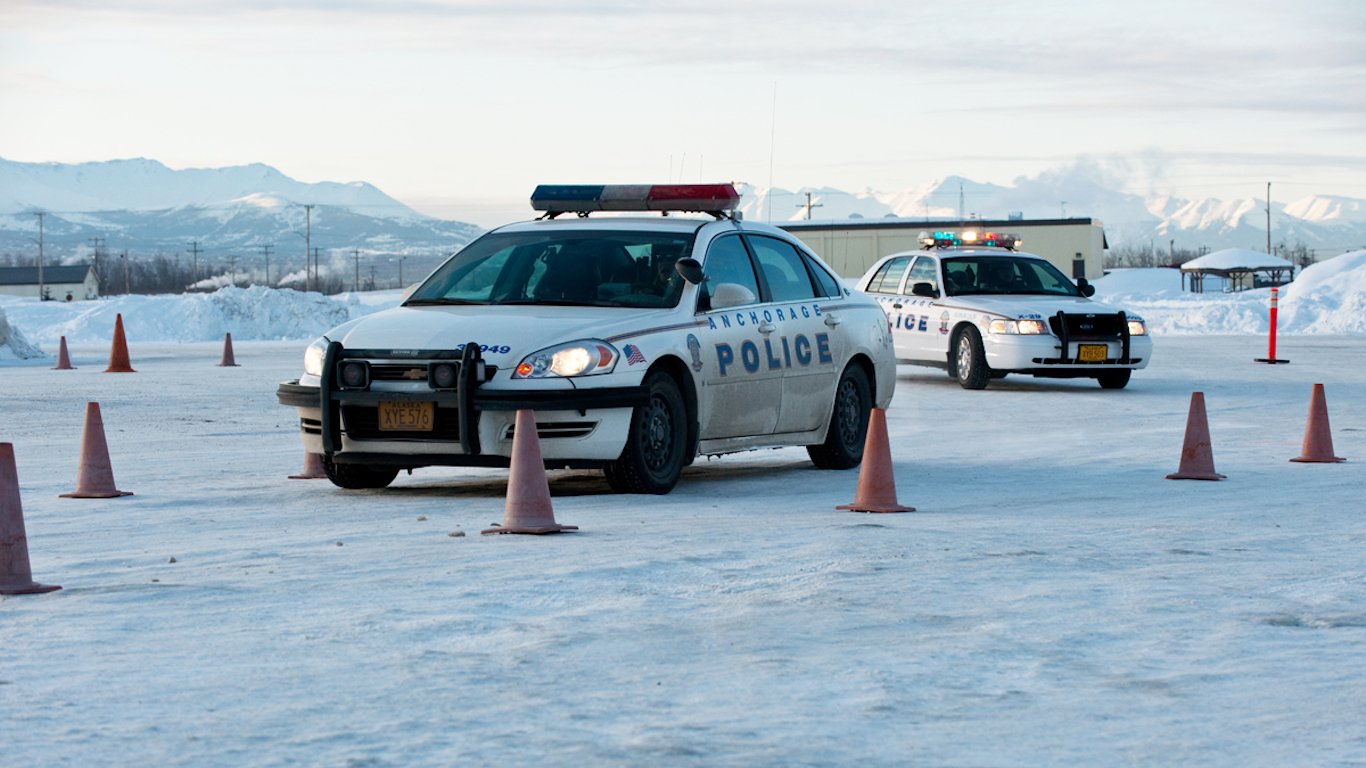
Alaska
Statistic: 885 violent crimes per 100,000 people
Alaska’s violent crime rate is higher than that of every other state and more than double the national rate of 369 violent crimes per 100,000 in 2018, according to the FBI.

Arizona
Statistic: 169 days per year with temperatures of 90 degrees F and above
Phoenix is the hottest city in America with the most days per year with temperatures of at least 90 degrees. Tucson, Arizona, is the second hottest with 147 days of 90 plus degree temperatures, according to the National Oceanic Atmospheric Administration.
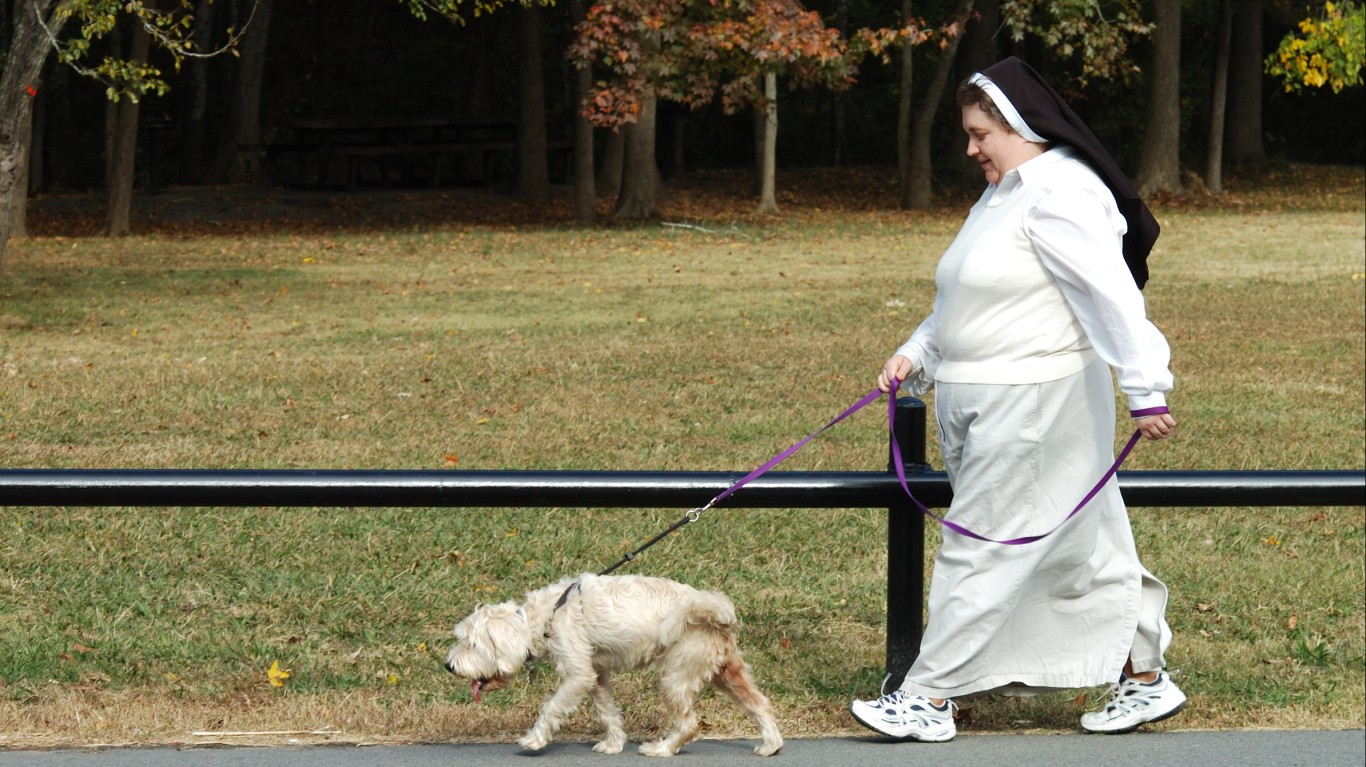
Arkansas
Statistic: 24.5% of adults are in fair or poor health
Adults in Arkansas are more likely to report being in fair or poor health than adults in every other state, according to County Health Rankings & Roadmaps.
[in-text-ad-2]

California
Statistic: 83.8% of adults have a high school diploma
The share of adults in California with a high school diploma is the lowest of any state in the country and well below the 88.3% national high school attainment rate.
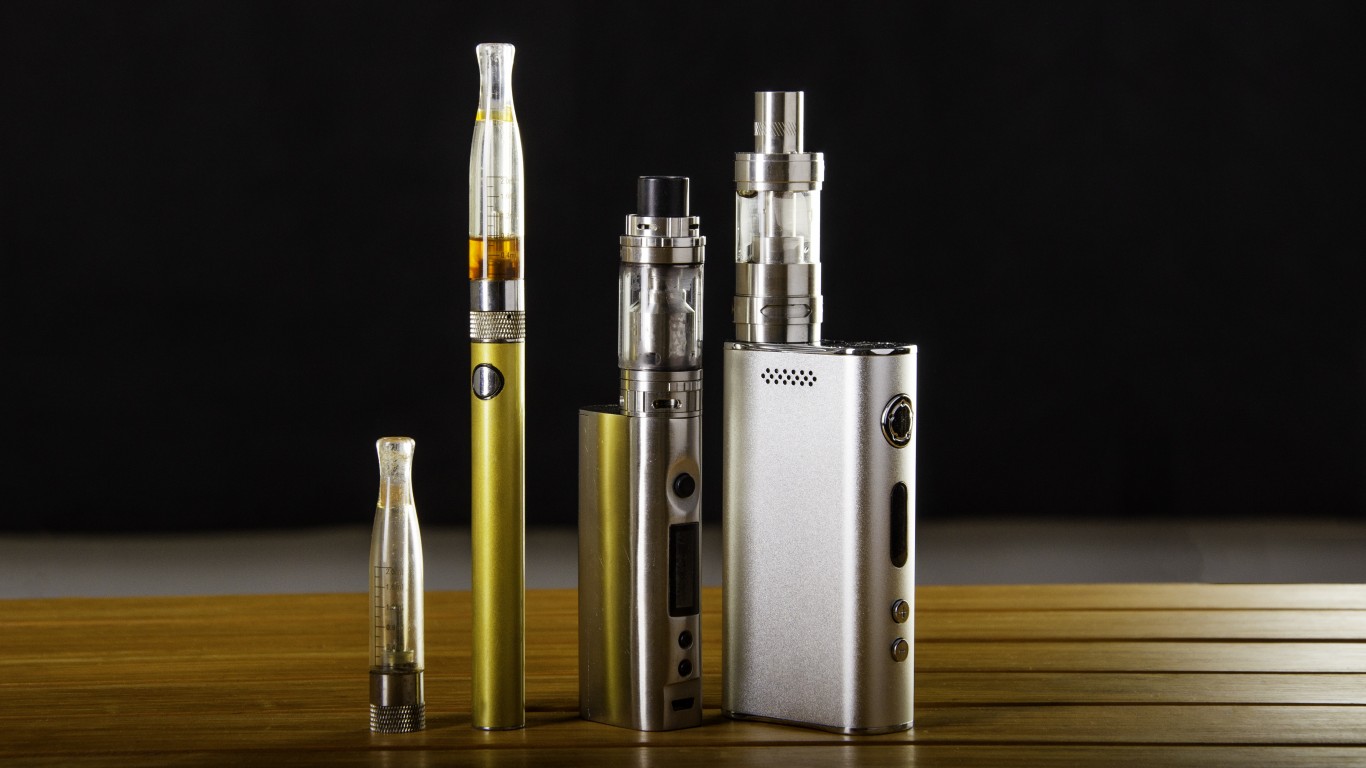
Colorado
Statistic: 7.5% e-cigarettes usage rate
According to the CDC, adults in Colorado are more likely to regularly use e-cigarettes or vaporizers than those in any other states.
[in-text-ad]
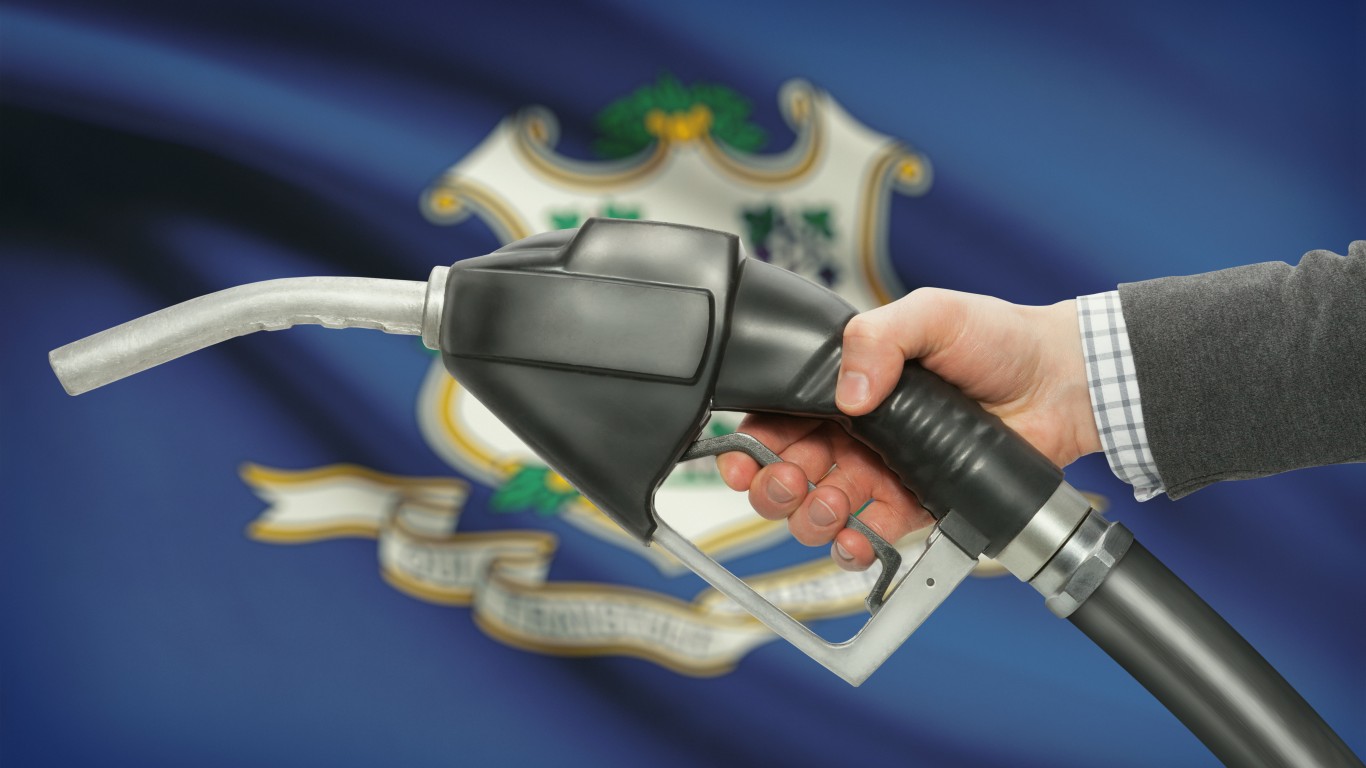
Connecticut
Statistic: $7,638 paid in state and local taxes per capita
Based on per capita payments, Connecticut residents have the highest state and local tax burden of nearly any other state, paying about $2,500 more than the national average.
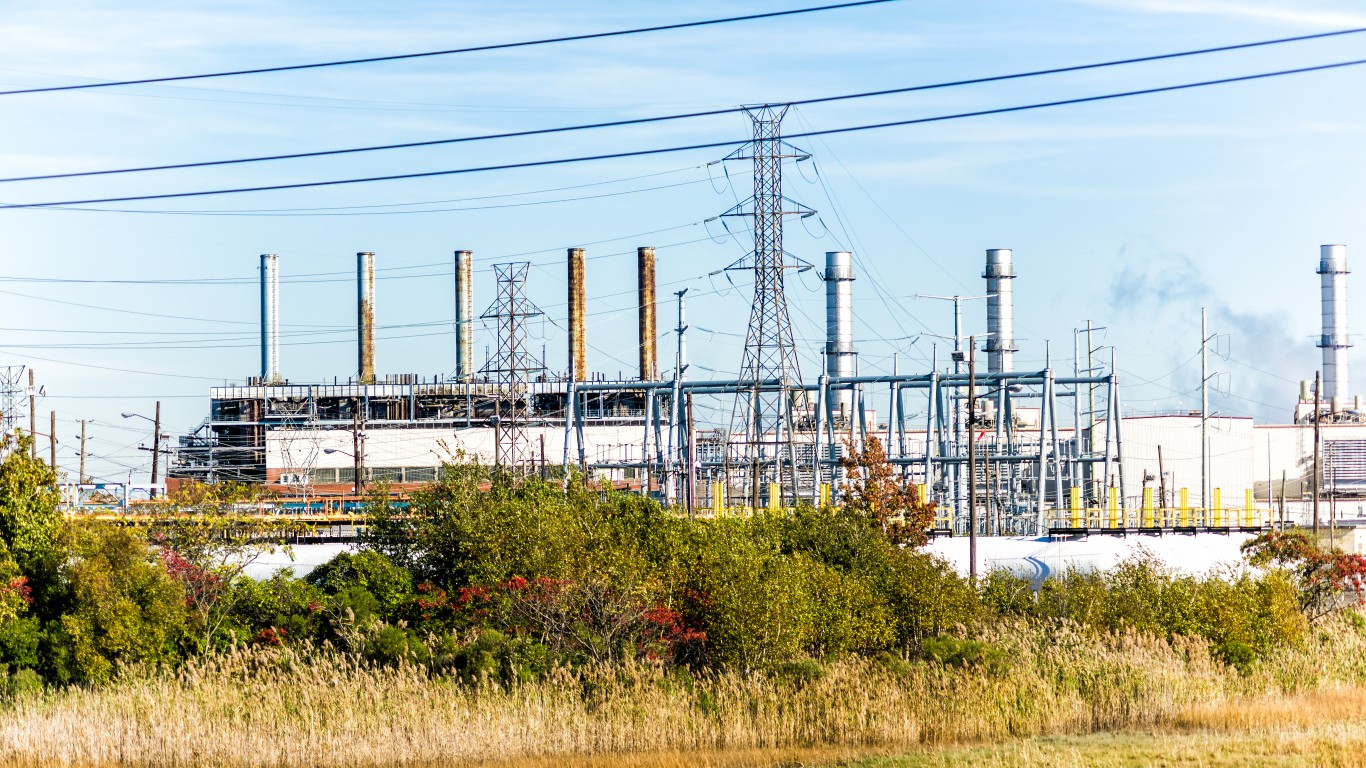
Delaware
Statistic: 3,390,000 BTU per capita of renewable energy
According to the U.S. Energy Information Administration, Delaware produced less energy from renewable sources on a per capita basis in 2017 than every other state.

Florida
Statistic: 229 tropical storms and hurricanes
Florida has been hit with more tropical storms and hurricanes since 1851 than any other state.
[in-text-ad-2]

Georgia
Statistic: 65.6% of young children receive important immunizations
Children between 19 and 35 months in Georgia are less likely to receive immunizations to protect against such diseases as mumps, measles, and tetanus than those in every other state.

Hawaii
Statistic: Median home value of $631,700
Hawaii has the most expensive real estate in the country, making homeownership less attainable for a larger share of residents.
[in-text-ad]

Idaho
Statistic: 25.0% of adults have some form of mental illness
Idaho has the largest share of adults who report having some form of mental illness in the United States. Nationwide, 18.6% of adults have a mental illness.
Illinois
Statistic: Baa3 credit rating from Moody’s
With a woefully underfunded pension system and a chronic budget deficit, Illinois has by far the lowest credit rating from financial services firm Moody’s — just above junk status.
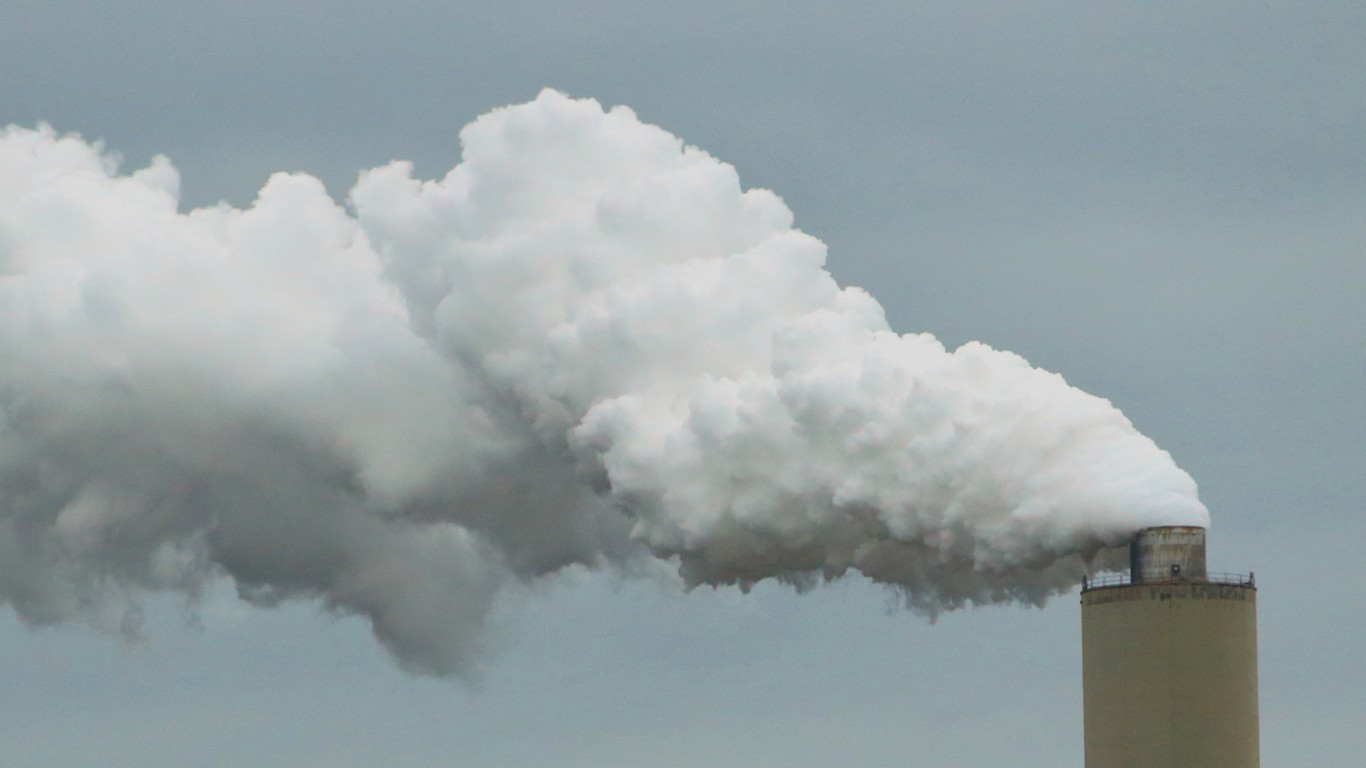
Indiana
Statistic: 11.8 PM2.5 per cubic meter of air
Indiana has the highest concentration of harmful air pollution of any state. Nationwide, the average daily concentration of PM2.5 — or particulate matter with a diameter less than 2.5 micrometers — is 8.6 per cubic meter.
[in-text-ad-2]

Iowa
Statistic: Black residents 7 times more likely than whites to be arrested for drugs
The racial disparity in arrests for drug possession is higher in Iowa than in nearly every other state in the country.
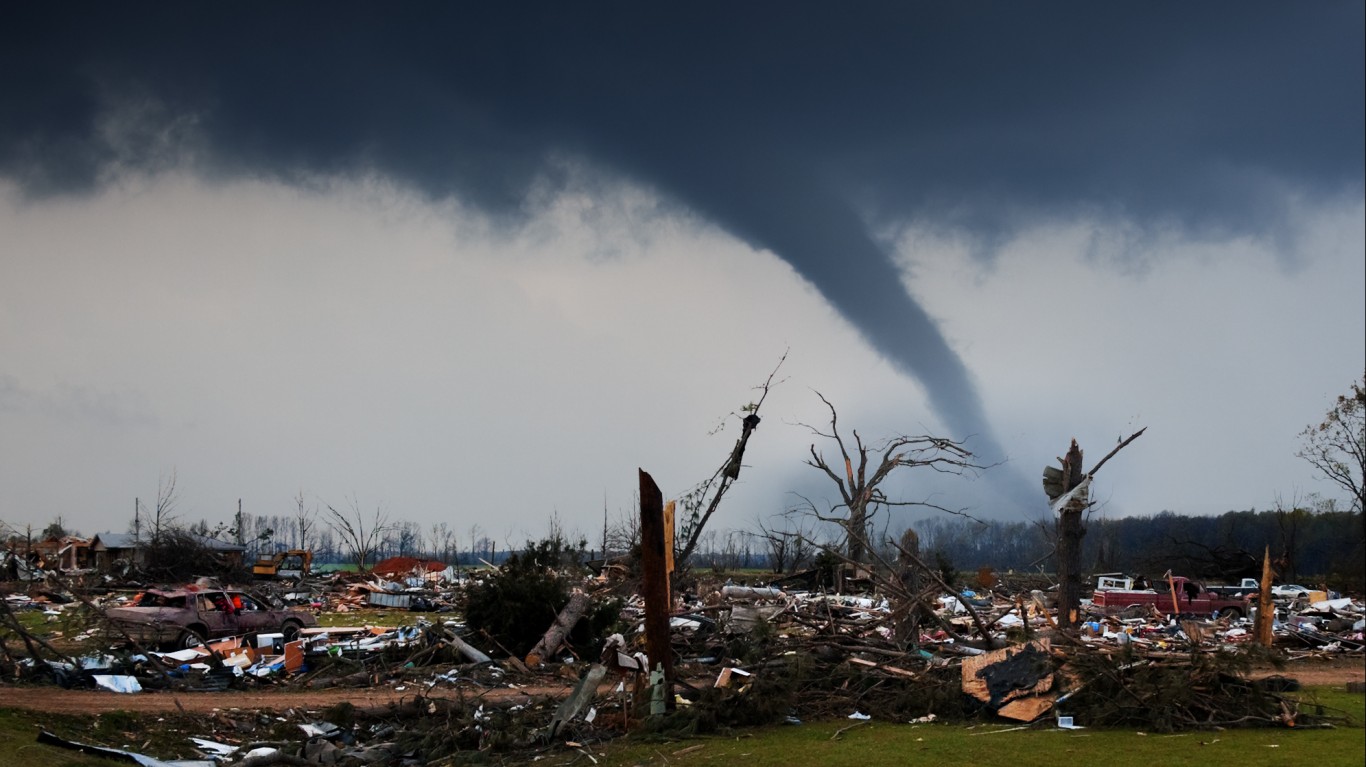
Kansas
Statistic: 4,254 tornadoes
There were more tornadoes in Kansas between 1950 and August 2018 than in every other state besides Texas.
[in-text-ad]

Kentucky
Statistic: 33.9% of pension obligations have funding
Kentucky is facing a pension crisis — it has the smallest pension funding ratio of any state.
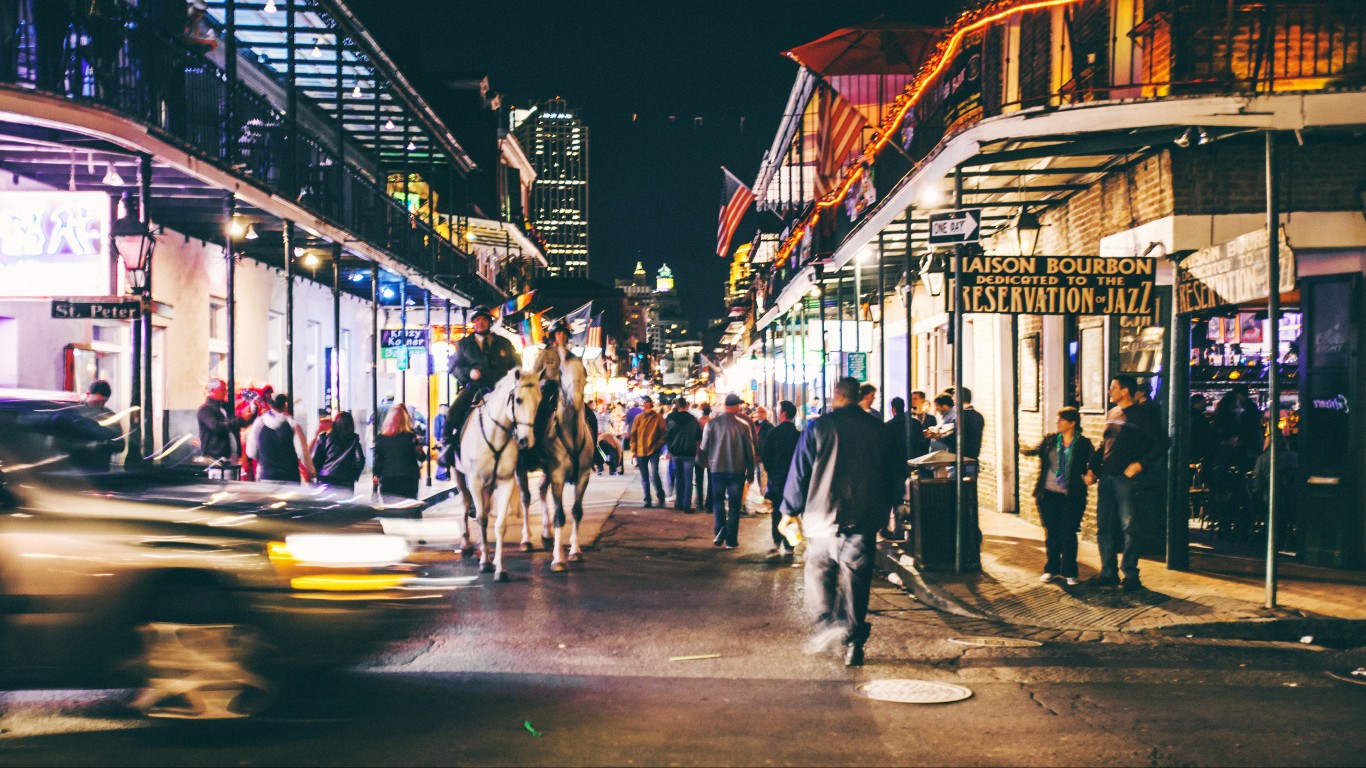
Louisiana
Statistic: 11.4 murders per 100,000 residents
Louisiana’s murder rate is higher than that of any other state and more than double the mational homicide rate of 5.0 murders per 100,000 people, according to the FBI.
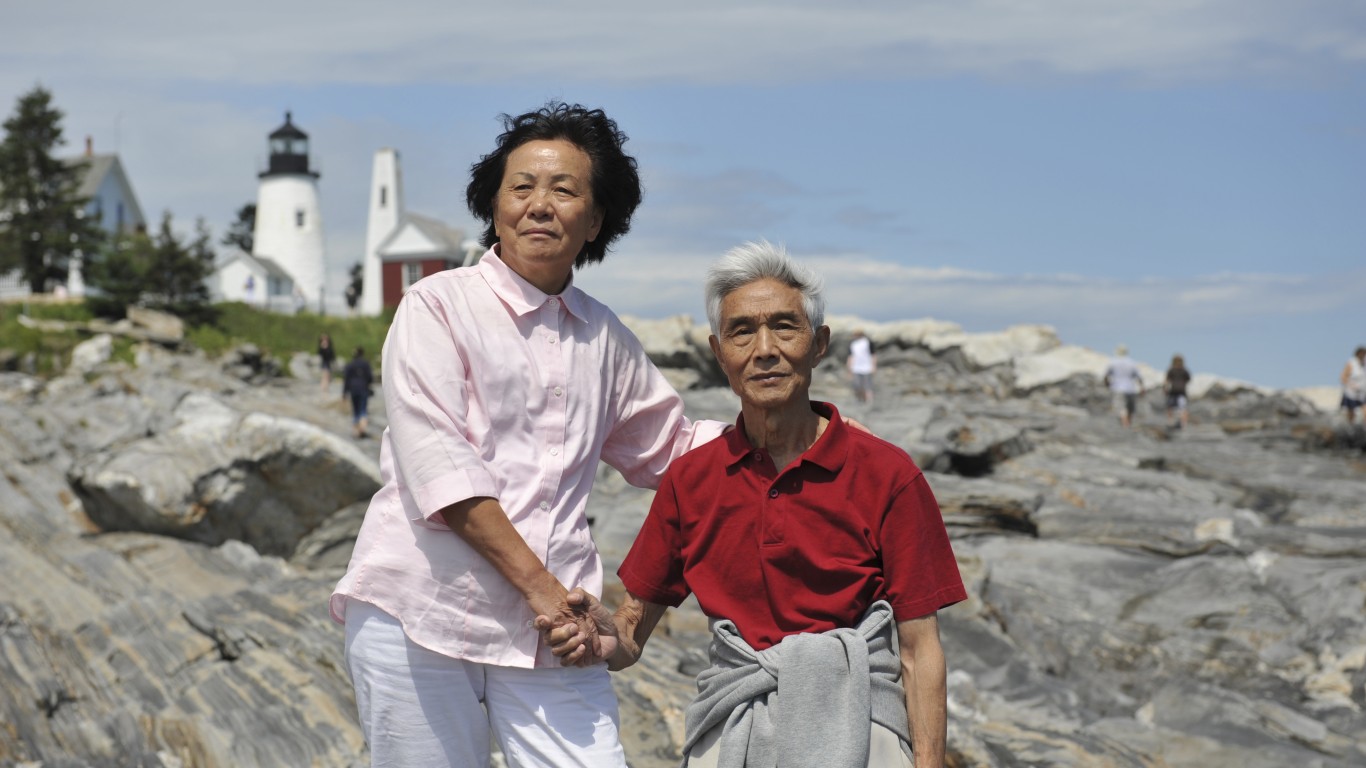
Maine
Statistic: 20.6% of the population are 65 or older
Maine is home to the largest share of 65 and older residents in the country. This poses a unique set of problems, including a smaller working-age population, smaller tax base, and higher health care costs.
[in-text-ad-2]
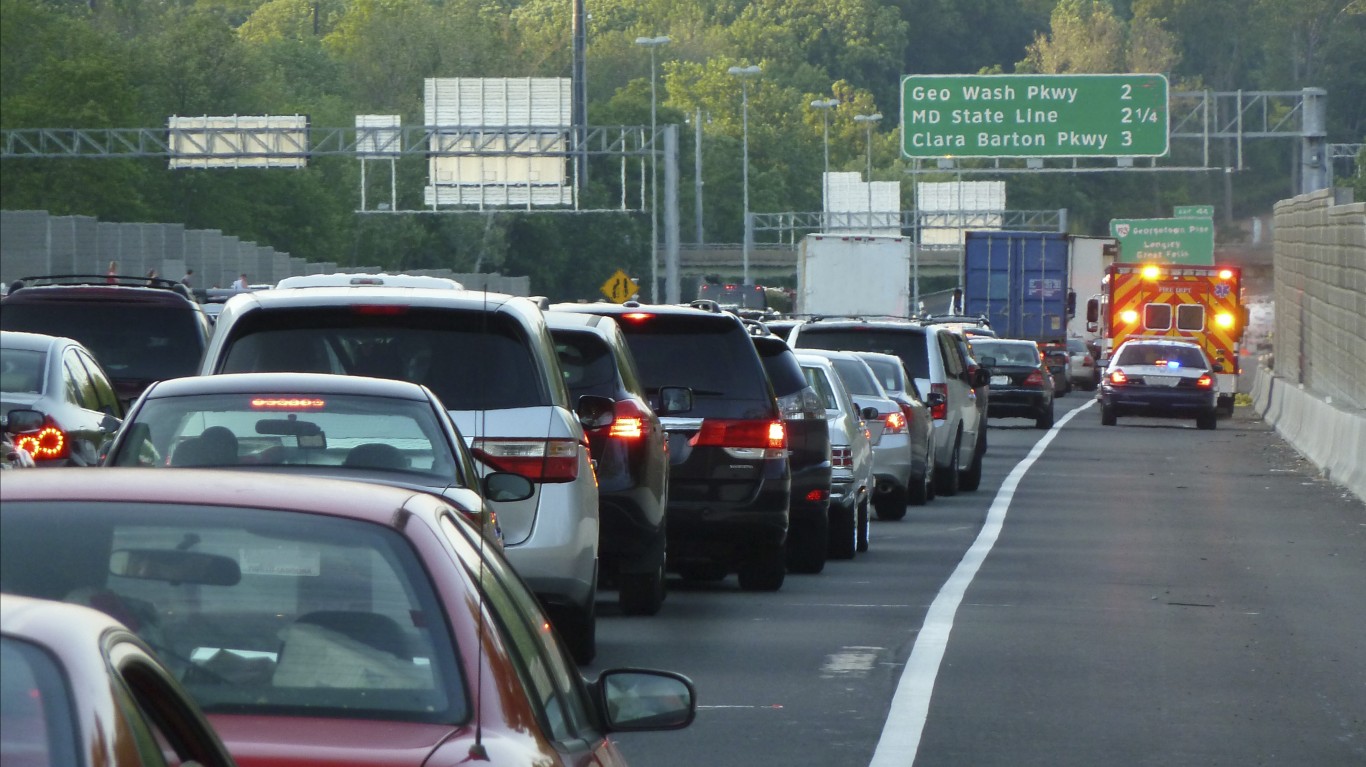
Maryland
Statistic: 49.1% of commuters drive alone for at least 30 min. to work
Workers in Maryland are more likely to commute by car — alone — for over a half hour to work than those in every other state.

Massachusetts
Statistic: $11,225 in outstanding debt per capita
No state has more outstanding government debt on a per capita basis than Massachusetts.
[in-text-ad]
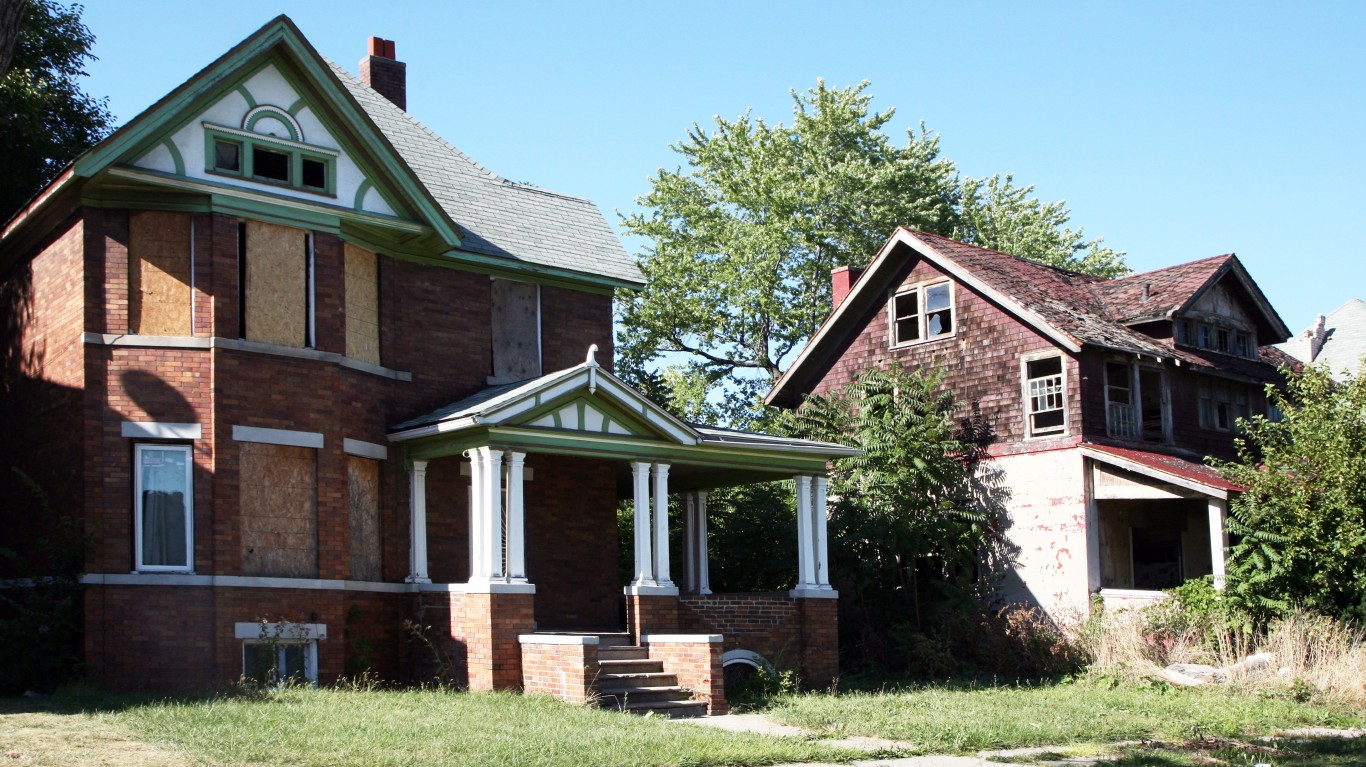
Michigan
Statistic: 1.1% projected population decline
Michigan is projected to have the largest population decline between 2020 and 2030 of any state. Over the same period, the U.S. population is projected to grow by 8.7%.
Minnesota
Statistic: 23 days with below zero temperatures
Of all major U.S. metropolitan areas, the Minneapolis metro has the most days per year with sub-zero temperatures.
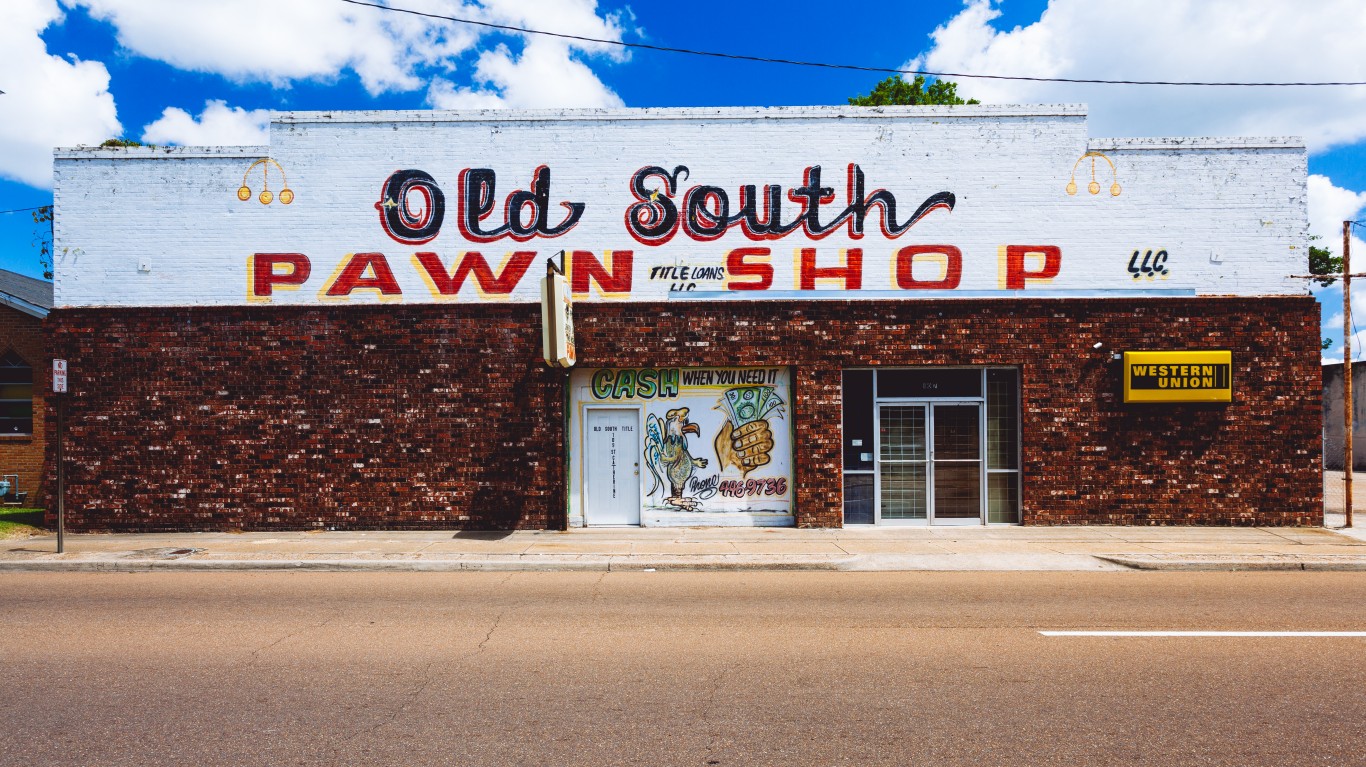
Mississippi
Statistic: 19.7% of residents live below the poverty line
Mississippi has the highest poverty rate of any state — well above the 13.1% national poverty rate.
[in-text-ad-2]
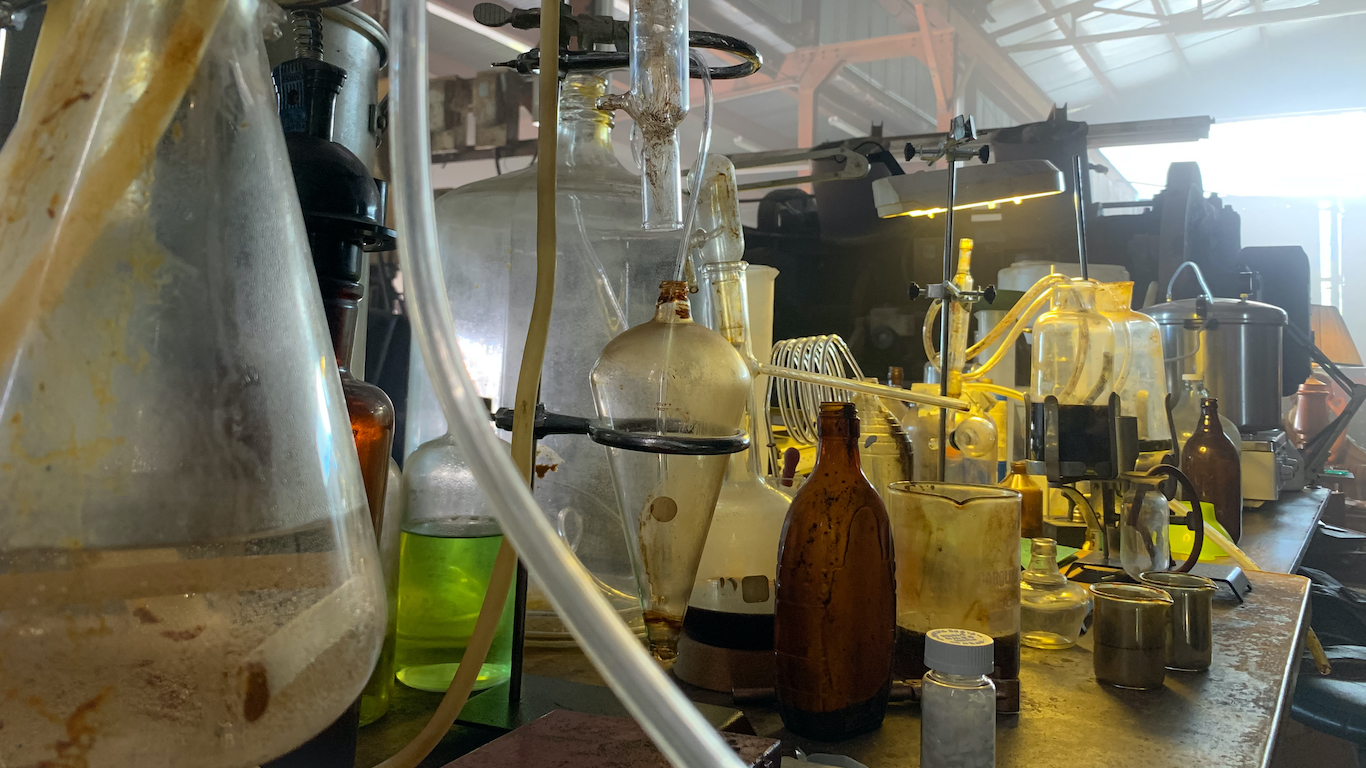
Missouri
Statistic: 3,022 drug labs found since 2000
Police found more drug labs in Missouri over the last 20 years than in any other state. Oklahoma is in a distant second place with 2,357 drug labs, according to the DEA.

Montana
Statistic: 7.6 drunk driving deaths per 100,000 people
Montana has the worst drunk driving fatality rate of any state — more than double the national rate of 2.7 drunk driving-related fatalities per 100,000.
[in-text-ad]
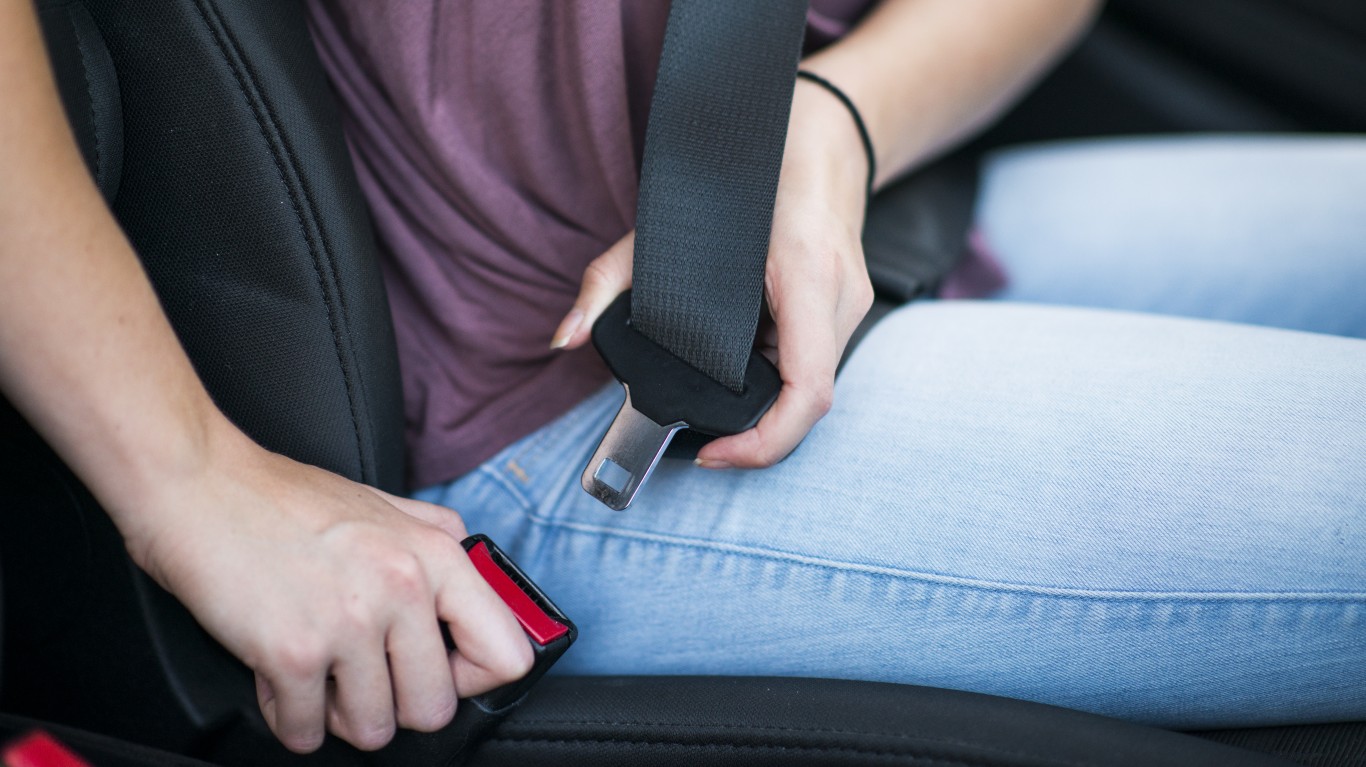
Nebraska
Statistic: 75.2% of adults wear a seatbelt
Adults in Nebraska are less likely than those in the vast majority of other states to use a seatbelt when driving or riding in a car. Nationwide, 85.6% of adults always use a seatbelt.

Nevada
Statistic: 4.4 divorces for every 1,000 residents
There were more divorces per capita in Nevada in 2018 than in any other state.

New Hampshire
Statistic: 7.5 hate groups per million residents
According to the Southern Poverty Law Center, New Hampshire has the highest concentration of hate groups of all states with at least 10 active hate groups.
[in-text-ad-2]

New Jersey
Statistic: 129.5 Superfund sites per 50,000 sq. miles
New Jersey has by far the highest concentration of sites contaminated with hazardous waste of any state in the country.

New Mexico
Statistic: 3,420 property crimes per 100,000 people
New Mexico has the highest property crime rate of any state — well above the national rate of 2,200 property crimes per 100,000 people, according to the FBI.
[in-text-ad]

New York
Statistic: Wealthiest 20% of households earn 5.7 times more than poorest 20%
New York has the worst income inequality of any state. For reference, the wealthiest 20% of households nationwide earn 4.9 times as much as the poorest 20%.

North Carolina
Statistic: 14.0% of individuals under age 65 struggle with medical costs
North Carolina is home to the largest share of residents under age 65 who have high out-of pocket medical costs, relative to their annual income.
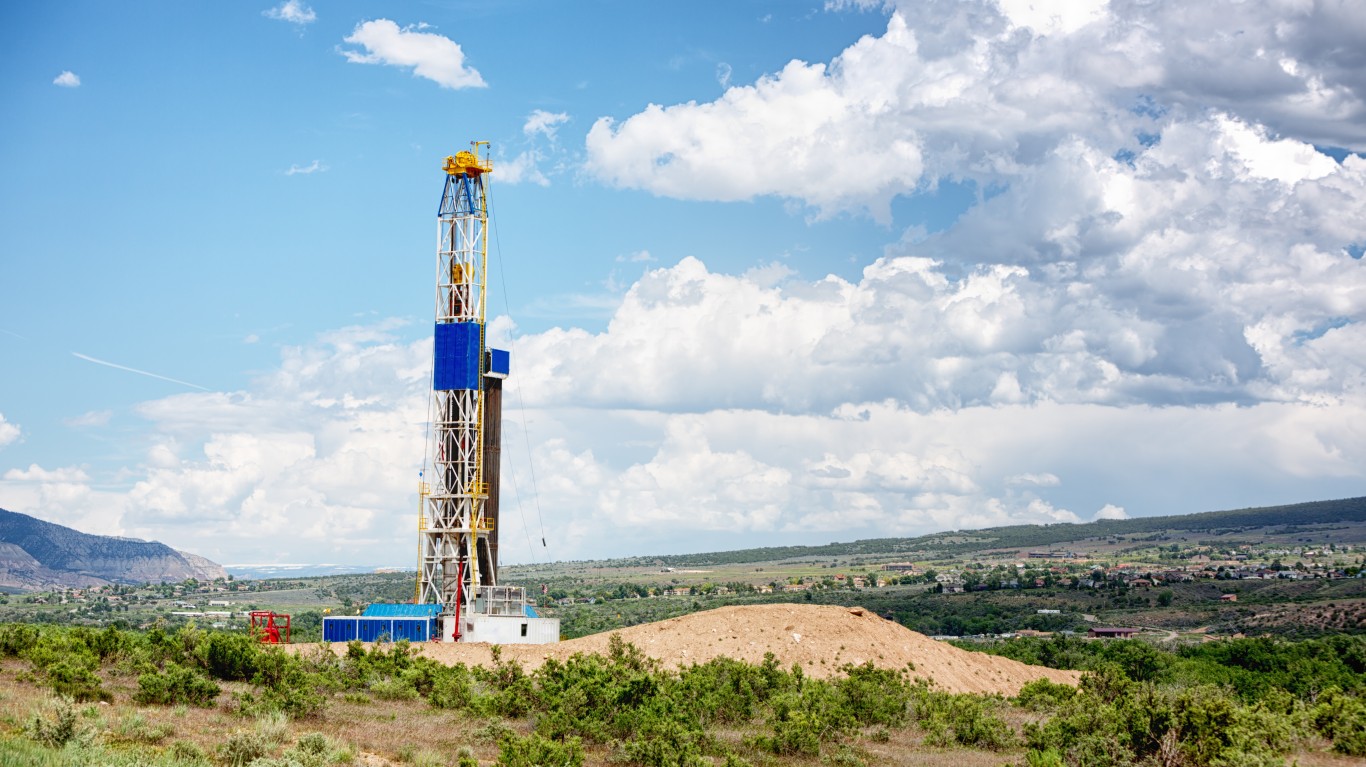
North Dakota
Statistic: 7.6% of adults have a graduate or professional degree
Adults in North Dakota are less likely than those in every other state to have a graduate or professional degree. Nationwide, 12.6% of adults have an advanced degree.
[in-text-ad-2]
Ohio
Statistic: 15.3% of juvenile prisoners are sexually victimized
Ohio has the highest rate of juvenile prisoners who report being forced into sexual activity with other prisoners or with prison staff members, more than double the 7.1% national rate.

Oklahoma
Statistic: 20.0% of adults are without health insurance
Oklahoma has the highest uninsured rate among adults age 19 to 64. The comparable national uninsured rate is 12.0%.
[in-text-ad]
Oregon
Statistic: 76.7% high school graduation rate
The share of high school students who graduate within four years of enrollment is smaller in Oregon than every other state other than New Mexico. Nationwide, the on-time high school graduation rate stands at 84.6%, according to the U.S. Department of Education.
Pennsylvania
Statistic: 197 winter driving fatalities
Pennsylvania had more winter driving deaths between 2013 and 2017 than every state except for Michigan. The state’s deadliest road in winter months is I-80.
Rhode Island
Statistic: 23.9% of bridges are in poor condition
The share of bridges in poor condition in Rhode Island is far higher than any other state. Nationwide, only 5.4% of bridges are classified as being in poor condition.
[in-text-ad-2]
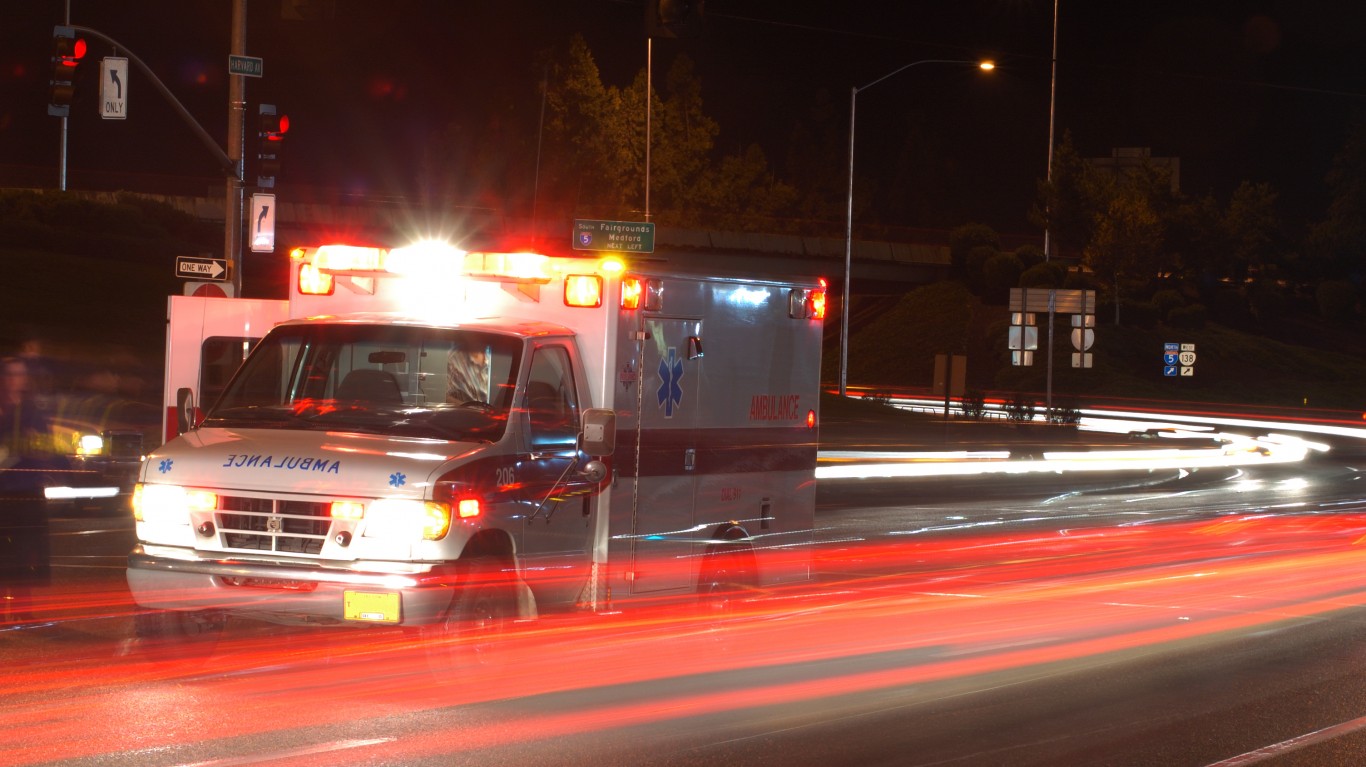
South Carolina
Statistic: 20.4 motor vehicle fatalities per 100,000 people
There were more driving deaths per capita in South Carolina than every other state except for Mississippi in 2018. There were 11.5 driving deaths per 100,000 people nationwide the same year.
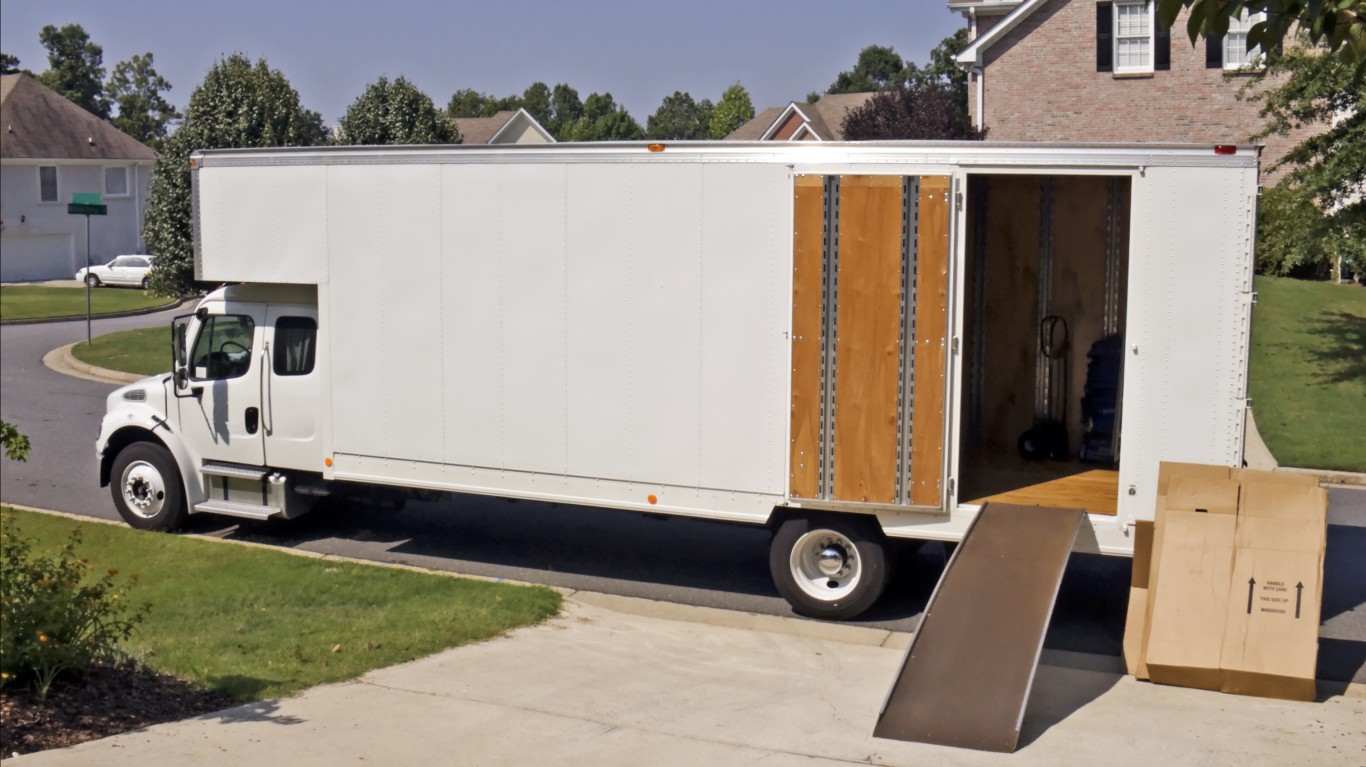
South Dakota
Statistic: 24.0% gap between highly educated people who leave and who stay
So-called “brain drain” — more highly-educated people leaving than staying — is worse in South Dakota than in any other state other than Vermont.
[in-text-ad]

Tennessee
Statistic: 5.4% of adults in Tennessee have had a stroke
A larger share of adults have had a stroke in Tennessee than in any other state. For reference, 3.4% of American adults nationwide have had a stroke.

Texas
Statistic: 18.6% of residents are uninsured
A larger share of the Texas population lacks health insurance than any other state. Nationwide, the uninsured rate stands at 10.0%.
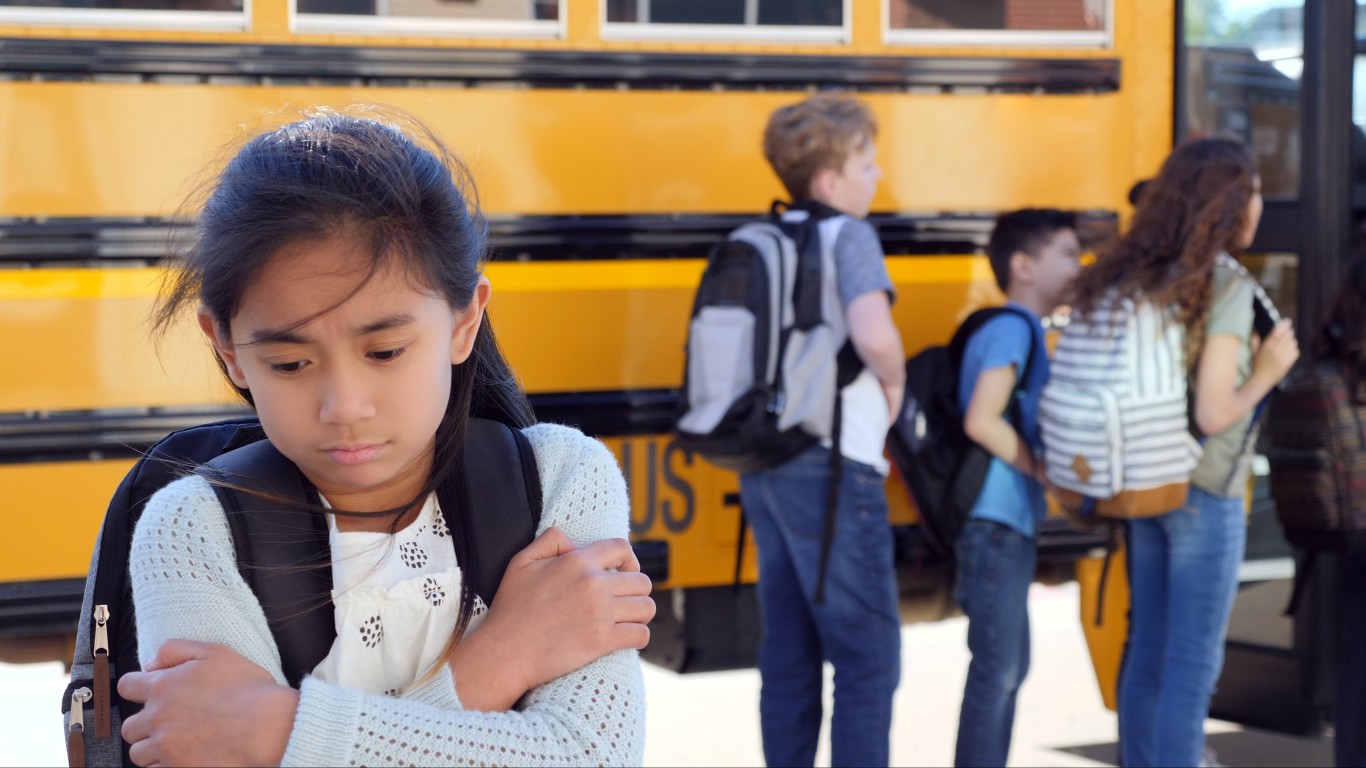
Utah
Statistic: $7,179 per pupil expenditure
Utah spends less on public education per student than any other state in the country. On average, per student spending across all states totalled $12,201 in fiscal 2017.
[in-text-ad-2]

Vermont
Statistic: 45.3% young adult drug use rate
According to the Substance Abuse and Mental Health Services Administration, the share of 18 to 25 year olds in Vermont who reported using illicit drugs in the past month was by far the highest share of any state. The comparable national rate was less than 25%.

Virginia
Statistic: $7.25 minimum wage, 26% of what is needed to sustain a family
Virginia has the worst ratio of minimum wage to what is needed sustain a family of any state. The state also has no mandatory paid sick leave or guarantee for paid time off for a pregnancy and child birth.
[in-text-ad]

Washington
Statistic: 152 days of rain per year
Seattle, Washington, has more days of rain per year, on average, than most major U.S. cities.

West Virginia
Statistic: 48.3 drug overdose deaths per 100,000 people
West Virginia has the highest drug overdose death rate in the country — more than double the national rate of 19.2 drug overdose deaths per 100,000.

Wisconsin
Statistic: 26.2% of adults drink excessively
Wisconsin has the highest excessive alcohol consumption rate among states, well above the 18.0% national rate.
[in-text-ad-2]
Wyoming
Statistic: 10.9 workplace deaths per 100,000 workers
Wyoming has the highest occupational fatality rate of any state — well above the national rate of 4.4 workplace deaths per 100,000 workers.
Are You Still Paying With a Debit Card?
The average American spends $17,274 on debit cards a year, and it’s a HUGE mistake. First, debit cards don’t have the same fraud protections as credit cards. Once your money is gone, it’s gone. But more importantly you can actually get something back from this spending every time you swipe.
Issuers are handing out wild bonuses right now. With some you can earn up to 5% back on every purchase. That’s like getting a 5% discount on everything you buy!
Our top pick is kind of hard to imagine. Not only does it pay up to 5% back, it also includes a $200 cash back reward in the first six months, a 0% intro APR, and…. $0 annual fee. It’s quite literally free money for any one that uses a card regularly. Click here to learn more!
Flywheel Publishing has partnered with CardRatings to provide coverage of credit card products. Flywheel Publishing and CardRatings may receive a commission from card issuers.
Thank you for reading! Have some feedback for us?
Contact the 24/7 Wall St. editorial team.
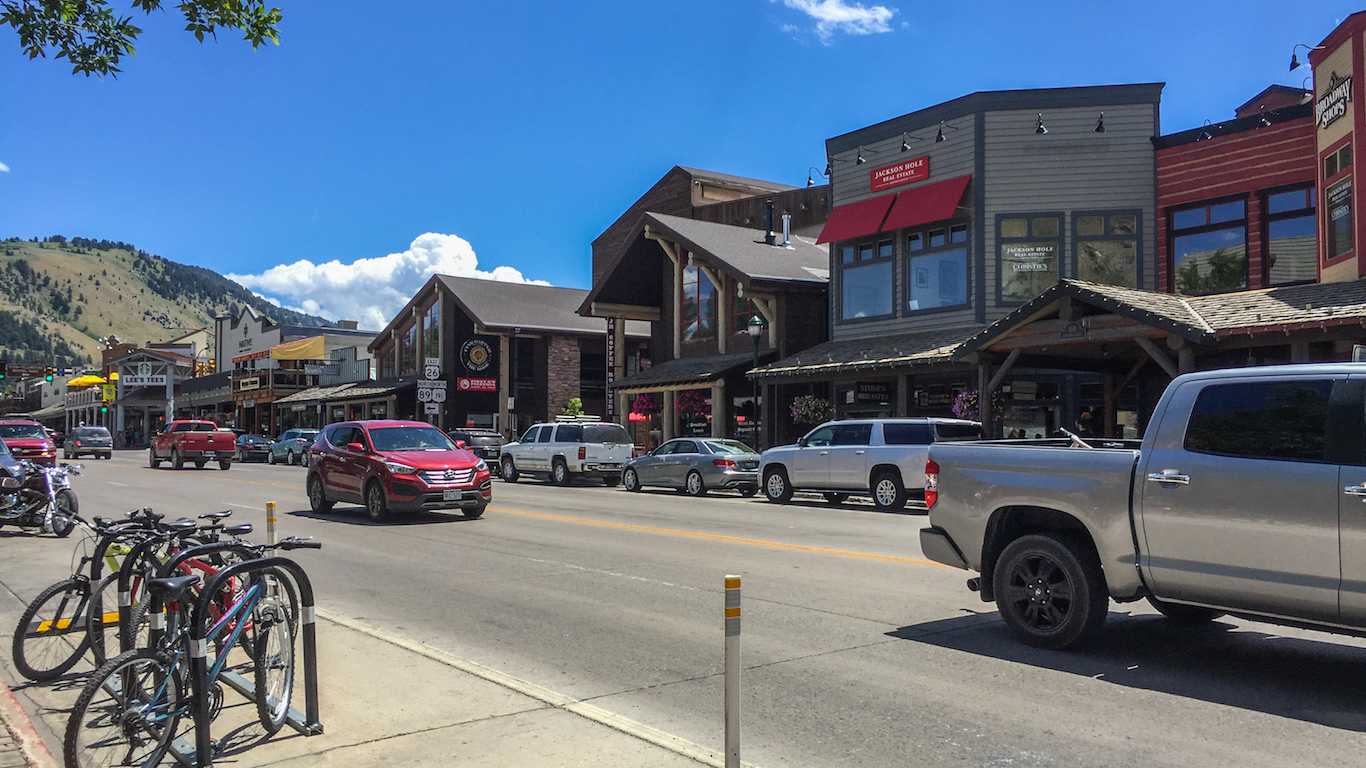 24/7 Wall St.
24/7 Wall St.
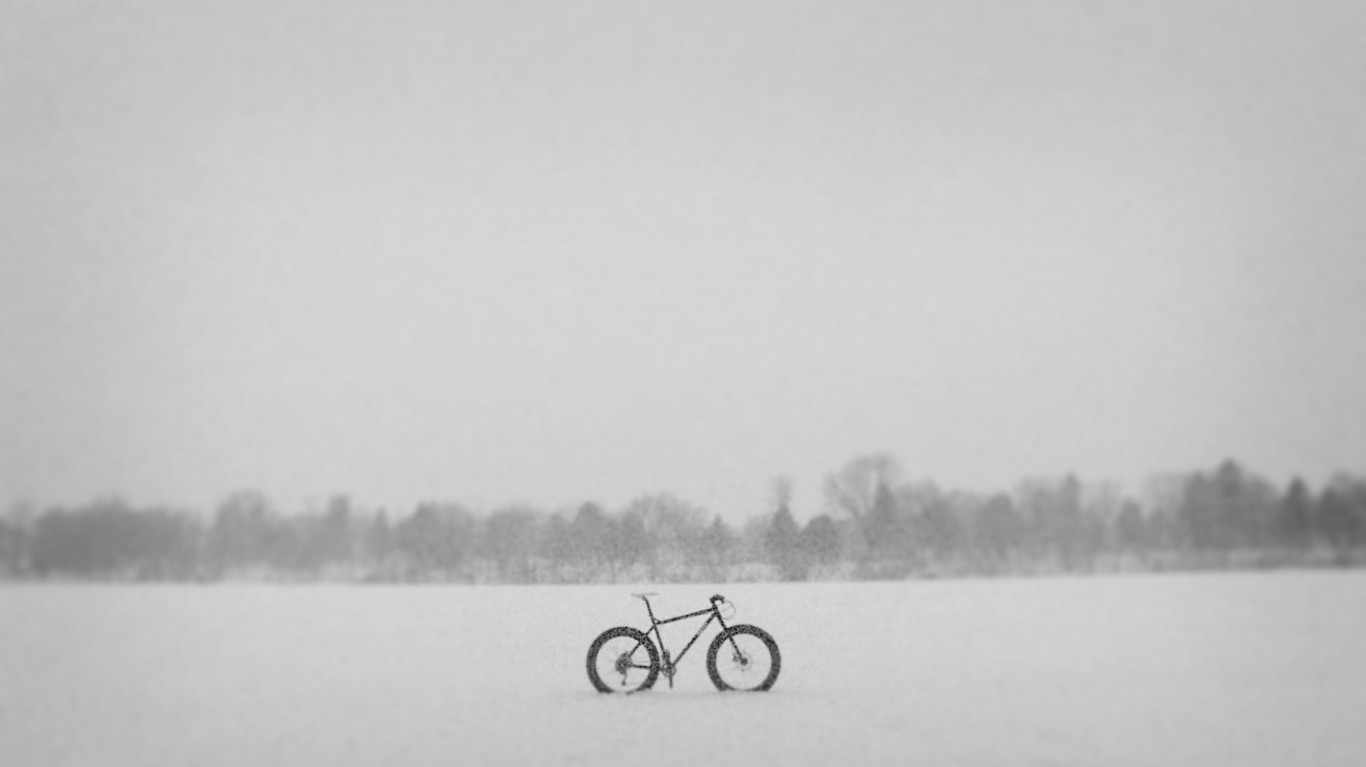
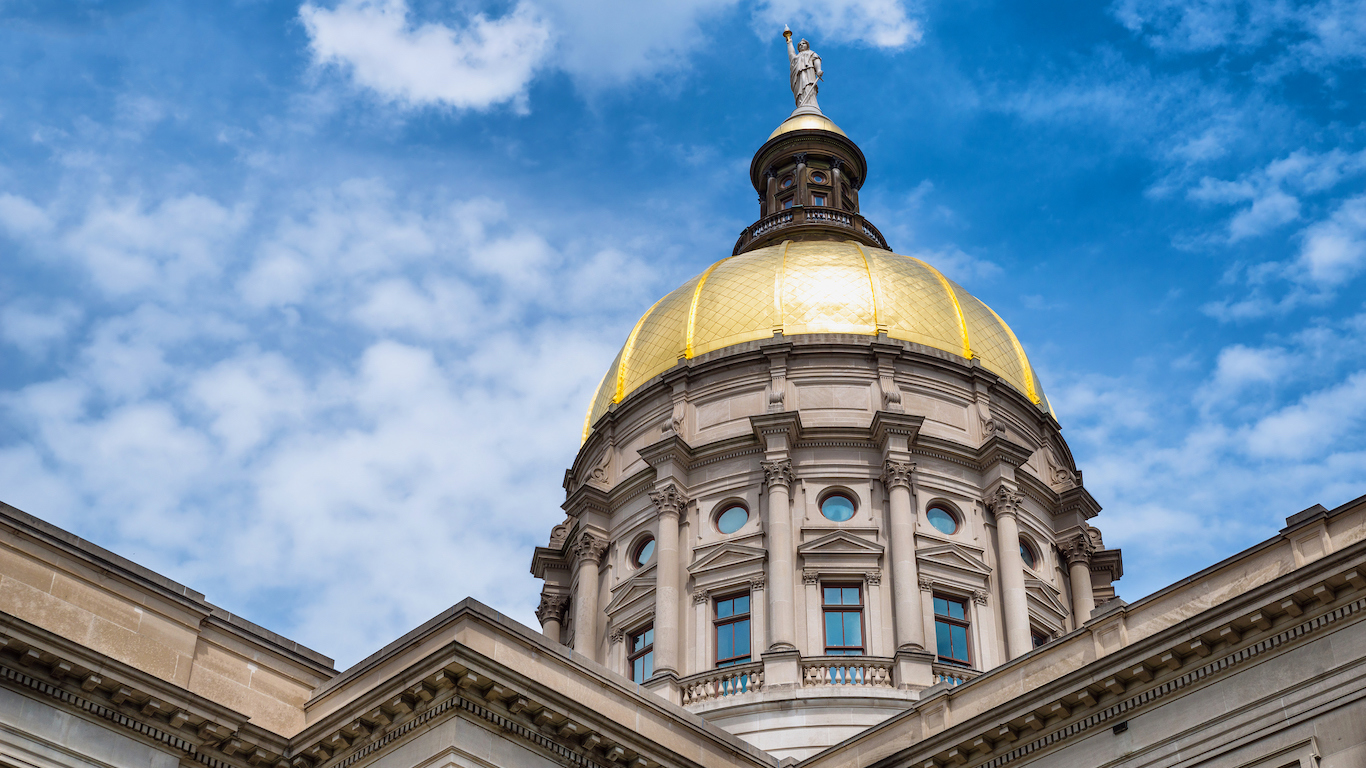 24/7 Wall St.
24/7 Wall St.